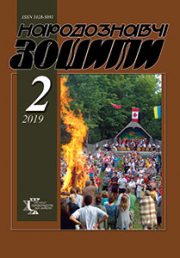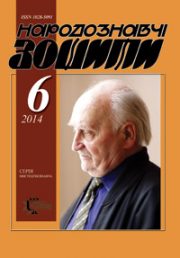The ethnology notebooks. 2018, 1 (139), 27–35
UDK 271.4-726.1-9”654”
DOI https://doi.org/10.15407/nz2018.01.027
Received 29.11.2017
WITH BOUNDLESS LOVE TO GOD, WITH ANXIETY AND RESPONSIBILITY FOR THE UKRAINIAN PEOPLE!
Pavliuk Stepan Petrovych, Doctor of Sciences in History, Professor,
Academician of NAS of Ukraine,
Director of the Institute of Ethnology
of the National Academy of Sciences of Ukraine.
Svobody Avenue 17, 79000, Lviv, Ukraine.
Contacts: Tel.(032) 297-01-57; e-mail: ina@mail.lviv.ua
Abstract. A retrospective view on the formation of the Ukrainian Church, stages of its existence for more than a thousand years period, is presented. The missionary role of Metropolitan Andrei Sheptytskyi, the spiritual leader of the nation, is deduced.
Keywords: Ukrainian Church, Metropolitan Andrei Sheptytskyi, statelessness, nation.
REFERENCES
Lentsyk, V. (2010). Vyznachni postati Ukrains’koi tserkvy: Mytropolyt Andrej Sheptyts’kyj i Patriarkh Josyf Slipyj. L’viv.
Marusyn, M. (2008). Arkhypastyr skytal’tsiv Arkhiiepyskop Ivan Buchko. L’viv.
Sheptyts’kyj, A. (2010). Nasha derzhavnist’ Yak buduvaty Ridnu khatu. L’viv: Artos.
Sheptyts’kyj, A. (2007). Pastyrs’ki poslannia (1939–1944) (T. 1). L’viv: Artos.
Sheptyts’kyj, A. (2009). Pastyrs’ki poslannia (1939–1944) (T. 4). L’viv: Artos.
Krechun, P. (2013). Sviatyj Josafat Kuntsevych (1580–1623) iak svidok viry. L’viv: Misioner.
Sheptyts’kyj, A. (2009). Pastyrs’ki poslannia (1918–1939) (T. 2). L’viv: Artos.
Pelikan, Ya. (2015). Ispovidnyk mizh Skhodom i Zakhodom. Portret ukrains’koho Kardynala Josyfa Slipoho. L’viv : Artos.
Pys’ma-poslannia Mytropolyta Andreia Sheptyts’koho. Biblioteka «Lohosu». T. 30. S. 333–334.
Sheptyts’kyj, A. (2010). Pastyrs’ki poslannia (1939–1944) (T. 3). L’viv: Artos.







